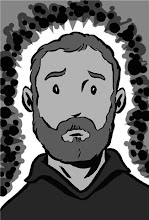PLM: Can I start by asking you at what age you decided you'd like to be a writer, and what inspired that decision?
PC: I was eighteen, and I'd just flunked my first term of astrophysics at UCL and left the course. I had no other way to earn money, so I had to turn my hobby into my profession. I think being flung in the deep end like that is a very good way for a young writer to learn quickly, but I wouldn't encourage it.
PLM: So how did you cope with the pressures of turning that hobby into a hard cash? How long did it take to start earning something like a healthy crust?
PC: It was about six years before I started selling anything meaningful.I lived in poverty, basically, helped by the Enterprise Allowance scheme.
PLM: During the time you were struggling, did you have a mentor figure to guide you through the vagaries of writing, or have you relied purely upon talent and your own natural evolution as a writer?
PC: I think my earliest mentor was Hilary Salmon at the BBC, who tried very hard to get me writing something else that could be made after my early competition win. Then Steven Moffat came along, and introduced me to his producer then, Sandy Hastie. Through her I met Russell Davies, and everything went from there, really. Moffat's responsible for a lot!
PLM: And what were the best bits of advice they gave you?
PC: I couldn't pin particular advice to particular people, but I think the best thing I was ever told was to listen and change when someone gave you reasons they'd rejected a particular piece. Someone who goes 'no,you see, what I was trying to do...' is delayed the point where they can start being a writer.
PLM: So, almost two decades and God knows how many words later, having worked on the likes of Doctor Who, Captain Britain & MI-13, and Black Widow: Deadly Origins, you're now in the position where you've been labelled as the man who might 'lead...the next British invasion of writers in Amercian comics'. Do you have any parting words for those just beginning their career, or struggling to progress, which might help or inspire them to reach the same levels of success?
PC: Well, I sum it up in one line: 'listen when an editor tells you why they've turned down your story, do not make excuses, change as a result of what you hear.' And it's also true to say that, while it's very difficult to succeed, it is possible, and showing up for every opportunity and keeping on trying is the only way it happens.
PLM: Thank you very much indeed, Paul.
Please join me in a toast to Paul. I've had the pleasure of meeting Paul (albeit briefly!) a few times now, and he really is a fabulous chap. You can follow his success on his website.

If you have enjoyed this blog, please consider making a donation to my preferred charity, the Myasthenia Gravis Association. Thank you.










